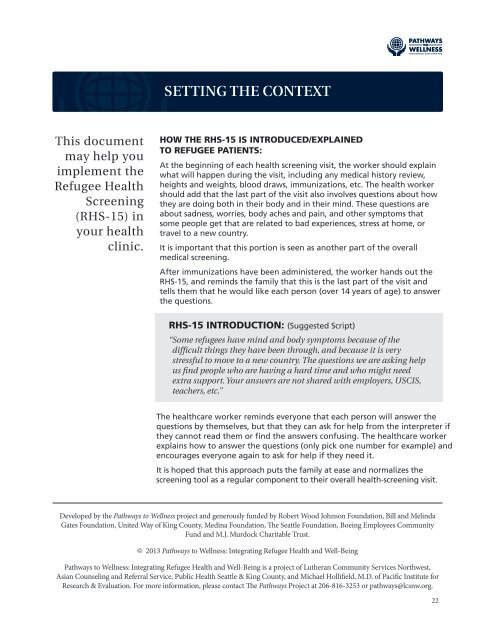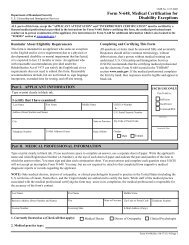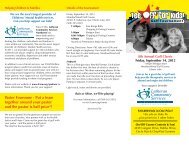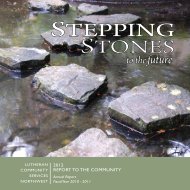to download the Refugee Health Screener Tool - Lutheran ...
to download the Refugee Health Screener Tool - Lutheran ...
to download the Refugee Health Screener Tool - Lutheran ...
Create successful ePaper yourself
Turn your PDF publications into a flip-book with our unique Google optimized e-Paper software.
SETTING THE CONTEXT<br />
This document<br />
may help you<br />
implement <strong>the</strong><br />
<strong>Refugee</strong> <strong>Health</strong><br />
Screening<br />
(RHS-15) in<br />
your health<br />
clinic.<br />
HOW THE RHS-15 IS INTRODUCED/EXPLAINED<br />
TO REFUGEE PATIENTS:<br />
At <strong>the</strong> beginning of each health screening visit, <strong>the</strong> worker should explain<br />
what will happen during <strong>the</strong> visit, including any medical his<strong>to</strong>ry review,<br />
heights and weights, blood draws, immunizations, etc. The health worker<br />
should add that <strong>the</strong> last part of <strong>the</strong> visit also involves questions about how<br />
<strong>the</strong>y are doing both in <strong>the</strong>ir body and in <strong>the</strong>ir mind. These questions are<br />
about sadness, worries, body aches and pain, and o<strong>the</strong>r symp<strong>to</strong>ms that<br />
some people get that are related <strong>to</strong> bad experiences, stress at home, or<br />
travel <strong>to</strong> a new country.<br />
It is important that this portion is seen as ano<strong>the</strong>r part of <strong>the</strong> overall<br />
medical screening.<br />
After immunizations have been administered, <strong>the</strong> worker hands out <strong>the</strong><br />
RHS-15, and reminds <strong>the</strong> family that this is <strong>the</strong> last part of <strong>the</strong> visit and<br />
tells <strong>the</strong>m that he would like each person (over 14 years of age) <strong>to</strong> answer<br />
<strong>the</strong> questions.<br />
RHS-15 INTRODUCTION: (Suggested Script)<br />
“Some refugees have mind and body symp<strong>to</strong>ms because of <strong>the</strong><br />
difficult things <strong>the</strong>y have been through, and because it is very<br />
stressful <strong>to</strong> move <strong>to</strong> a new country. The questions we are asking help<br />
us find people who are having a hard time and who might need<br />
extra support. Your answers are not shared with employers, USCIS,<br />
teachers, etc.”<br />
The healthcare worker reminds everyone that each person will answer <strong>the</strong><br />
questions by <strong>the</strong>mselves, but that <strong>the</strong>y can ask for help from <strong>the</strong> interpreter if<br />
<strong>the</strong>y cannot read <strong>the</strong>m or find <strong>the</strong> answers confusing. The healthcare worker<br />
explains how <strong>to</strong> answer <strong>the</strong> questions (only pick one number for example) and<br />
encourages everyone again <strong>to</strong> ask for help if <strong>the</strong>y need it.<br />
It is hoped that this approach puts <strong>the</strong> family at ease and normalizes <strong>the</strong><br />
screening <strong>to</strong>ol as a regular component <strong>to</strong> <strong>the</strong>ir overall health-screening visit.<br />
Developed by <strong>the</strong> Pathways <strong>to</strong> Wellness project and generously funded by Robert Wood Johnson Foundation, Bill and Melinda<br />
Gates Foundation, United Way of King County, Medina Foundation, The Seattle Foundation, Boeing Employees Community<br />
Fund and M.J. Murdock Charitable Trust.<br />
© 2013 Pathways <strong>to</strong> Wellness: Integrating <strong>Refugee</strong> <strong>Health</strong> and Well-Being<br />
Pathways <strong>to</strong> Wellness: Integrating <strong>Refugee</strong> <strong>Health</strong> and Well-Being is a project of Lu<strong>the</strong>ran Community Services Northwest,<br />
Asian Counseling and Referral Service, Public <strong>Health</strong> Seattle & King County, and Michael Hollifield, M.D. of Pacific Institute for<br />
Research & Evaluation. For more information, please contact The Pathways Project at 206-816-3253 or pathways@lcsnw.org.<br />
22





